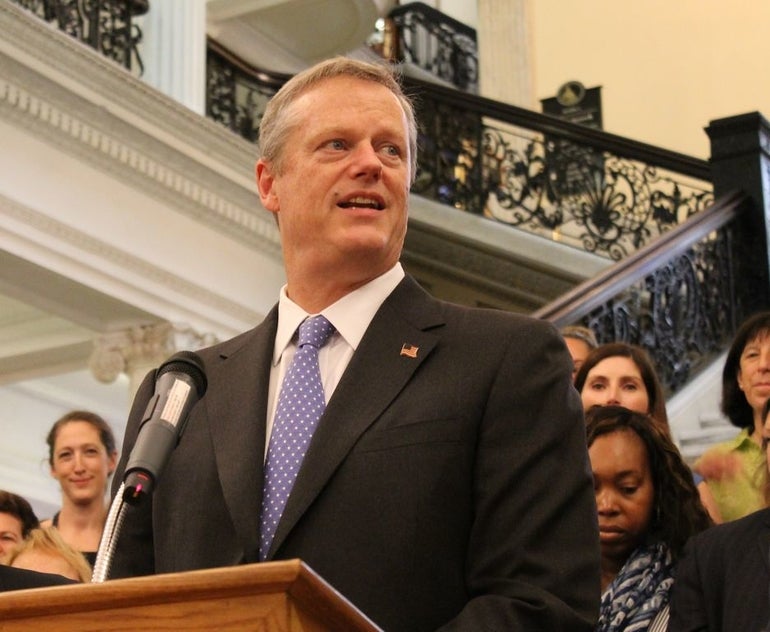A second Cabinet secretary said Tuesday that theadministration is willing to back away from Gov. Charlie Baker’s controversial proposal to impose a $2,000-per-employee assessment on companies that don’t meet certain health insurance requirements.
In response to the only questioning she received on the proposal at Tuesday’s Ways and Means Committee budget hearing, Health and Human Services Secretary Marylou Sudders said Massachusetts needs to wrestle with MassHealth spending, but that the administration is open to an alternative to the assessment.
“The administration has been very open to if not this, then what?” Sudders said. “A budget proposal is the opening and we clearly changed the conversation and we have been wanting to hear what other options could be available … so we’ve been very open to that.”
Baker’s proposal, filed in January along with his fiscal year 2018 budget plan, would impose a $2,000 per employee assessment on companies with 11 or more employees that don’t offer health coverage or that do not insure at least 80 percent of their full-time employees. It was met with almost immediate opposition from business organizations, who says the significant charge could hit employers whose workers are opting not to take their insurance offerings.
The assessment represents an important new revenue source for Baker, who largely opposes new or increased taxes, and its consideration comes in the midst of debate over Congressional plans to replace the Affordable Care Act. The successor plan could pull substantial federal revenues out of Massachusetts.
In a letter to members of the Massachusetts Congressional delegation Tuesday, Baker estimated the American Health Care Act sponsored by Republican leaders would result in $1 billion less in federal revenue for Massachusetts in 2020, $1.3 billion less in 2021 and $1.5 billion in 2022, “with likely a greater annual impact in the years that follow.” In addition, Baker said up to $475 million in federal support for a health care waiver his administration negotiated with the Obama administration appears at risk under the federal bill, which faces crucial votes this week in Washington, D.C.
Sudders said that 70 percent of Massachusetts employers with fewer than 11 employees do not offer coverage, 25 percent of employers who employ between 11 and 50 workers do not offer coverage, and 6 percent of employers with more than 51 employees don’t offer coverage.
The administration has been “meeting with the business community about alternatives to the employer contribution,” she said.
Earlier this month, Administration and Finance Secretary Kristen Lepore said, “If someone else has a better idea on how to accomplish this then, yes, we are open to other ideas.” She also indicated the administration would meet with business representatives to discuss an alternative.
The administration’s proposal is intended to stem the flow of full-time workers who choose to enroll in MassHealth rather than their employer’s plan, a cost driver that’s straining the entire state budget and consuming funds that could be invested elsewhere.
MassHealth reached an all-time high enrollment — covering a projected 1.93 million people in fiscal 2017 — putting major pressure on state finances.
The assessment is projected to generate $300 million over the last six months of fiscal 2018 and would generate as much as $585 million when in effect for a full year, according to Baker administration estimates.
Sudders, in her testimony to the committee, framed the proposal as a revival of the so-called fair share contribution plan, which was critical to the 2006 universal health care law in Massachusetts before it was repealed to make way for a similar provision in the federal Affordable Care Act. Business groups have argued that Baker’s assessment, which they view as a tax, is a far greater penalty than the original and is assessed in a different manner.
The 2006 law originally mandated that employers with 11 or more full-time employees make a “fair and reasonable” contribution to their health insurance, or pay a $295 per employee penalty. Though it was applied differently, that law also contained a take-up threshold of 75 percent.
Explaining the differences between the old law and Baker’s proposal, Sudders said, “Eleven years later, 80 percent, from where we were sitting, didn’t seem that difficult.”
She added, “We understand it’s difficult for the employer community.”
After her testimony, Sudders explained that the administration settled on a $2,000 per employee contribution because “the cost of insurance today is much more than” in 2006 when the $295 contribution was established and because $2,000 is still less than the $5,500 average cost of a single adult in the expanded Medicaid population.
Asked why the administration elected to propose an 80 percent take-up rate rather than the 75 percent rate under Chapter 58, Sudders said part of it was to “make the calculus work” in closing the projected $300 million budget hole in MassHealth.
“We felt it was a reasonably high bar, but a good bar because in Massachusetts we believe in health care coverage,” she said. “Under Chapter 58 everyone had skin in — it’s not a game — everyone had skin in health care coverage; employers, the state, individuals, a mandate.”
Though groups like the Greater Boston Chamber of Commerce, the Massachusetts Nonprofit Network, the Massachusetts Fiscal Alliance and the Retailers Association of Massachusetts have voiced staunch opposition to Baker’s proposal, almost two dozen health care providers, faith groups, community organizations, labor unions and advocacy groups voiced support for the idea in a letter last week.

